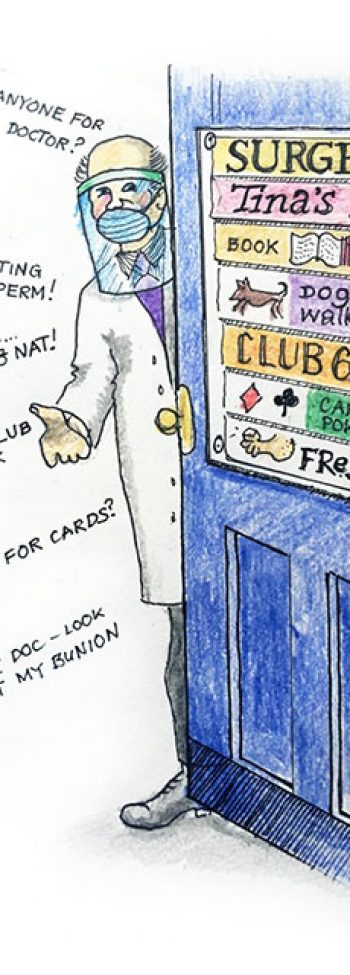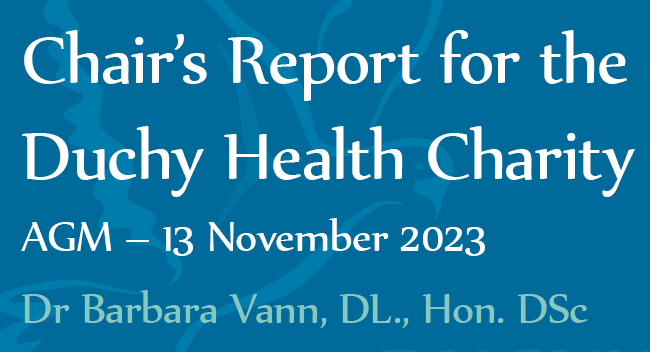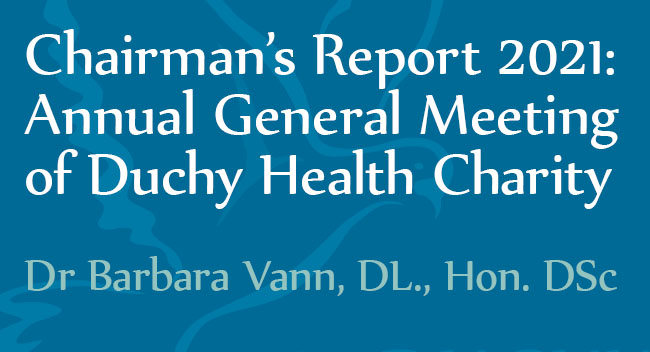Chair’s Report for the Duchy Health Charity AGM – 13 November 2023 Introduction The Trustees…
can apply for grants to help reach their objectives
Introduction
Perhaps it’s just as well that Duchy Health Charity’s (DHC) intended film launch and conference on social prescribing had to be abandoned (twice). Nobody could have expected the catastrophic and mind-bending changes that have taken place, and are in fact only just beginning, in our ‘normal’ way of life.
Old ideas almost certainly don’t fit into the new and fluid spaces that our society has moved towards.
Square pegs and round holes don’t begin to describe the new shapes that life has adopted.
The broader agenda of social prescribing, however, was about enabling communities to look after themselves without having to depend on GPs and pills. And that is needed now more than ever.

The new normal
We may yearn for a new normal, but we shall yearn in vain because there are so many questions asked, so few answers yet available; so many old ‘givens’ are challenged, so many prejudices tested, for example:
Is the retail shop trade dead?
Do we need cash?
Are offices now unnecessary?
Is foreign travel now unethical?
Can inequality be properly addressed?
What are schools for?
What are GPs for?
Should we have a Universal Basic Income?
… and a dozen other things, some of an existential nature.
What did lockdown teach us?
Quite a bit, I reckon.
Many of us don’t miss shopping one bit: deliveries work well, online ordering is fine, and anyway travelling to and parking near shops was always a chore.
‘Convenience’ stores, especially those in villages, have come into their own, as places where local produce is available, social interaction can occur, voluntary help is available, and most necessities can be obtained.
Takeaway meals as a substitute for dining out at restaurants work very well: same quality of food, less bother getting there and watching what you drink!
Virtual meetings can work perfectly well, and working from home for many is at least as good as working in a noisy office or other remote building.
Local travel – on foot or by cycle – opens up the opportunity to become better acquainted with one’s immediate environment instead of driving and having to avoid crowds at ‘beauty spots’, and is of course healthier and non-polluting.

Of course one has to accept that lockdown is far from comfortable for very many people, and especially those living alone, those in crowded apartment blocks with young children and without access to open spaces, and many others. And many such problems do not have an easy solution in the short term. And I haven’t touched on the economic aspects….
Nonetheless adding the positive and subtracting the negative aspects of lockdown/pandemic/financial insecurity enables one to think about how life/society/health services/economic activity could be better organised, and maybe, just maybe, one might emerge with an adapted and improved set of arrangements.
So travel with me into the New Look world, courtesy of a fertile imagination…..
The new look: village based society
It has been assumed for years that human activity shall take place more and more in larger and larger conurbations, to which (as in China) the peasantry feel obliged to migrate for work, services, survival etc. [I use peasantry in its original sense – country dwellers]. Young people customarily abandon families and villages and gravitate towards the bright lights and ‘opportunities’ afforded by the big city.
It is often forgotten that London, the archetypal conurbation, is really a string of villages that have over years become joined up, but in many ways still function as independent economic and social units in much the same way as do Mount Hawke, Carnon Downs and Chacewater. Therein you find complete societies: neighbours, families, small shops, village centres/halls and associated clubs/social activities, health centres/surgeries and a cross section of the people and services that keep society ticking along.
As I said in my introduction, the villages have fared well during lockdown.
Can the village model be amplified, improved, built upon, incorporated into our new look world? I rather think it can.
Consider the following questions and possible answers:
Easy: convenience stores work, and can be as good as supermarkets in a smaller space (viz Costcutter at Carnon Downs, the Co-op in Perranporth). They can, and some do already, major on local produce.
You set up a local depot in the village, perhaps joined to the convenience store, to which DPD etc deliver, and from which residents may collect or organise a local van to take things around. Thereby you avoid the village being overwhelmed by lorries and vans searching for addresses. You could also set up local facilities there for trying on clothes, shoes etc, and send them back on the next van out if they don’t fit. And – I’m sure you will not have missed the point – the local ‘depot’ becomes a village hub where people meet, volunteers volunteer, cafes are set up, grandparents meet their grandchildren etc. And there also is the local cinema.

Can villages provide access to sporting activities, cultural/theatrical events?
Why not? Parks for children, tennis courts, skate parks etc – easy. Larger events? You set up and build stadia/leisure centres in a ‘hub and spoke’ mode between village centres (for example at Chiverton Cross to serve lots of neighbouring communities), where also competitive team events can take place. They can also provide space for the other younger people’s activities – pop festivals, night clubs etc – which the villages won’t want in their midst!
What about the infrastructure?
Clearly there has to be major investment in properly functioning broadband to serve every house, so that people can live/work/play from their local environment. There will be less motor vehicle traffic in this model, and of course people will largely move about on foot or on cycles (probably largely electric). Public transport will be very local.
What about the traditional big city functions?
Finance? Online! The shell of the City of London which shall be left after this upheaval shall become a museum of the old capitalism, and have plenty of hotels for international tourists to stay and take selfies.
What about hospitals and health/care services?
Already we spend less and less time in hospitals. They will still be needed to conduct major surgery, complicated investigations, cancer treatments etc.. Recovery from those will be at local community hospitals, perhaps ideally provided on the same sites as the leisure centre. Local health services will still take place through local surgeries which will take back minor injury unit functions, but conduct the vast majority of consultations online. And in any case, a properly functioning village community will by definition be much healthier. There will be a reduced need for care homes in villages where the elderly and disabled are integrated within, rather than separated from, their communities. Finally, the overhyped Track, Trace and Isolate for Covid-19 scheme can be run locally (instead of anonymously from a call centre), so that volunteers who are locally known can help with the difficult job of telling contacts of Covid-19 (or subsequent epidemics) cases to isolate, and also help to see that they are properly provided for in their isolation.
What about schools?
What indeed…? I suspect that we are on the verge of a major revolution in education, and I am not yet ready to go to print on this. But I do think village primaries (and associated nurseries) should continue: and I also think post-primary children should not be forced down an academic route which deprives them of learning how to be contributory members of their local communities. The old (unstated) idea of running schools merely to keep youngsters off the streets has to be abandoned.
What happens to existing towns/conurbations (e.g. Truro)?
The village principles should apply there too, with the city becoming an agglomeration of smaller communities. People need to be accommodated in suitable housing in what is currently the shopping centre – the proposed Pydar Street development will need revisiting – to provide neighbourly areas with access to local shops and facilities. But the days of Truro as a retail centre, as well as the growth of metastatic out of town retail parks, are surely at an end.
All these suggestions will clearly need planned investment and cannot be completed in two shakes of a lamb’s tail.
The key must be the principle of the village. There are clearly opportunities for architects, town/village planners and entrepreneurs.

PS: I make no apology for not mentioning religion or other faith-based activities. I am not qualified to comment n these, but am certain that my specimen village will provide plenty of opportunities for faith-related functions. And I haven’t begun to answer questions on inequality etc, which doesn’t mean we shouldn’t discuss them.
What next then?
These thoughts are offered as a basis for discussion, in a changing world where the old ‘certainties’ clash with the advancing crises generated by globalisation, and our difficulties are compounded by the apparent inability of governments to stay ahead of the game. It is our civic duty to think our way through and out of this apparent impasse. Let It begin here.
Dr John Evers
June 2020
The views of this contributor are his own and are not part of Duchy Health Charity’s policy; we do not get involved in either politics or religion and we have created this Forum Platform to invite your comments.
Join in our discussion and let us have your views about our post-Covid world.
Email us at info@duchyhealthcharity.org putting VISION as the subject header.
Here are some we have already received
‘It is a really positive view of the impact of the last 100 or so days and of a devolved and impactful future for community that I would love to enjoy… it is a lovely colourful and inspirational read. [But] the flip side … is that this period has opened a wider inequality gap. Can we use this as an opportunity to reshape and reframe our support to communities and communities to focus on self- help for their populations? It will be tricky… [and] requires a shift in individual behaviours and organisational cultures.’
‘[Yes to] smaller living units and more personalised care…but beware parochialisms…narrow minded closed communities. All communities benefit from exposure to alien and conflicting cultures that challenge assumptions and traditions and fixed status quos and hierarchies. I do think there will be a brief post Covid period when a sense of a shared communal interest may make it possible to expand the involvement of the state in a benign role…taking on Social Care…re nationalising water and power…containing, taxing and controlling giant social media Barons.’
‘….the burden of action on this is exactly on the job description of local elected and non- elected public servants – unfortunately their track record is not great. How can we get the right people to represent us or take on these responsibilities?’
‘So what will become of somewhere like Truro? Shops and offices we don’t need any more? During the working day Truro’s population goes from 20k to 60k. Needs really careful management otherwise we end up with potentially empty shops and offices’.
‘I don’t think that the day of the town is done. I think towns need to regroup after the depredations of the post-war era – the depopulation of centres, the environmental damage of the cult of personal mobility, corporate disempowerment by absenteeism of landlords meaning that landlord and tenant often inhabit different economic parameters – so, I would promote corporate disinvestment, local ownership, a stronger more mixed-up occupation by people, making, selling, advising, learning, exploring, entertaining….where will the money come from to enable any investment? Unlike the apple which tempted Eve, it doesn’t fall off in the autumn to enlighten Newton, or to sweeten the brew!! It comes from taxes, which come from trading transactions – and towns generate much of the income which is taxed. The village is a sustainable form of human settlement. Neighbourhoods in towns are very similar and I can see a re-emergence of neighbourhoods (as long as planners stay out of the way!)’
‘In some ways it is giving us back many of the benefits which communities used to have. I have always felt that planning in Cornwall has been backing the wrong perspective for years. Truro has been expanding beyond its ability to cope at the expense of the rural hamlets. Those hamlets and small villages have lost shops, post offices and pubs while central Truro has been denuded of small independent businesses’.
‘There was nothing in here that I would not welcome, and I encourage as much as possible of this to actually happen. Mind you, although we Oldies do know the alternatives and can see the great sweep of where things are going and where they have come from, it will take young things to make them happen – through their own ownership, so their comments will count for more’.
‘I believe that there is a basic human need for communication, including a significant amount which is face-to-face. Communication includes speech of course but also personal contact, including pollution, touch. This applies at home, at work and other everyday activities. Over the past two months there have been terrific innovations in health, in business communication in shopping and suchlike, involving extremely effective and efficient use of technology. This is, however, at the expense of face-to-face communication and in the future, ways will have to be found to incorporate personal contact or replace it more satisfactorily… [The] paper has the great virtue that spontaneous and localised change can occur, so that the various components can complement each other as they go along. Certainly a top-down imposition of this kind of utopia would be doomed to failure, or just completely messed by the controllers. On the other hand government nudges along the way and even encouragement of the main policy drive, to small local community groups, would be extremely helpful.’
‘One of the things Covid has brought is a sincere recognition across the system that communities can mobilise and look after themselves to a great extent. Hallelujah!


